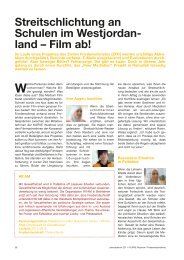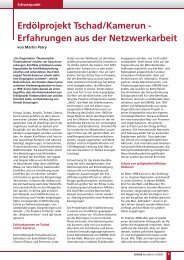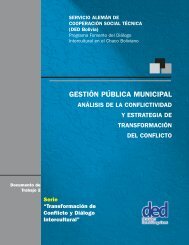Merging Ethiopian Wise-Counsel Mediation and Facilitative ...
Merging Ethiopian Wise-Counsel Mediation and Facilitative ...
Merging Ethiopian Wise-Counsel Mediation and Facilitative ...
- No tags were found...
You also want an ePaper? Increase the reach of your titles
YUMPU automatically turns print PDFs into web optimized ePapers that Google loves.
Stage 2: Debate <strong>and</strong> PolemicsThe parties lose confidence that they will be able to convince the other side. They still talk to each other, but the aim is rather to gainsupport from their own peers/the audience than to convince the opponent. They try to prove verbally that they are better. The debateis thus dominated by rhetoric tricks. The conversation undertones convey insulting messages about the other party.Sample case: In a live discussion broadcasted from the local radio station:OC: "It's so sad that I cannot discuss this with your predecessor who's unfortunately out of office now. He was always open for goodarguments."GC: "This is typical. I keep hearing even from members of your town council that you'd rather ridicule people than listen."OC: "Come on, you are just too proud to admit that you just didn't think it through. It would be more beneficial even for your people tobuild the school on our side. You don't act in the interest of your own people!"GC: "What a show you make! You already accepted our proposal, don't you remember? Is your memory that weak in other areas of lifeas well?"Stage 3: Actions not WordsHaving discussed without result for a time, the parties lose hope that they will manage to find an agreement. In desperate desire tomove things forward, the only thing they can do (in their view) is to take action unilaterally. One of the parties makes an importantmove without consulting the other party. Usually the party that became active had a good reason to do so, but the other party feelsovercome, sold out, <strong>and</strong> very upset. Once this border is crossed, it is difficult to come back to discussion without the help of a third partybecause deep mistrust has arisen. After one party takes action, the other party will do the same—as they have lost faith in discussing theproblem. They still talk but they would rather interpret each other's actions than believe each other's words. The risk of misinterpretationincreases dramatically.Sample case: Some time has passed <strong>and</strong> the leaders of the two communities meet again.OC: "You know, I have spoken to an official <strong>and</strong> submitted the plan ofthe school. Here is the plan for the building. He was very happy about myideas <strong>and</strong> agreed immediately."GC: "How can you do this? I thought we agreed to first have our communitydiscussion. You tricked me!"OC: "Ah, don't be silly. You know we cannot go on discussing forever. Whenthe representative came, I took the chance."?$Again sometime passes. Now GC takes action as a reprisal:GC: "I know you will be really glad about this. I talked to the community ?<strong>and</strong> I found a donor who will pay for the school building exactly at theplace that I proposed. Is this not great news? And since it was you who saidthat we have to hurry, I'm sure you will be really satisfied by now."80 <strong>Mediation</strong> Trainer’s Manual
















